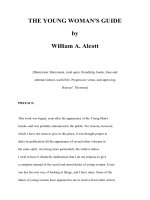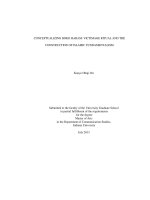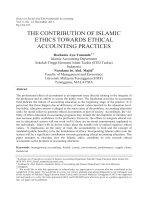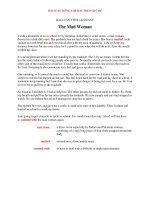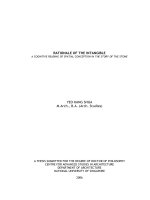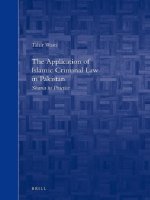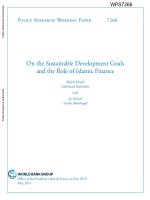The stone woman islamic quintet
Bạn đang xem bản rút gọn của tài liệu. Xem và tải ngay bản đầy đủ của tài liệu tại đây (1.75 MB, 320 trang )
EARLYBIRDBOOKS
FRESHEBOOKDEALS,DELIVEREDDAILY
LOVETOREAD?
LOVEGREATSALES?
GETFANTASTICDEALSONBESTSELLINGEBOOKS
DELIVEREDTOYOURINBOXEVERYDAY!
TheStoneWoman
BookThreeoftheIslamQuintet
TariqAli
For
SusanWatkins
whoseloveandcomradeshiphas
sustainedmethroughgoodtimesandbad
forthelasttwentyyears.
Contents
ONE
TWO
THREE
FOUR
FIVE
SIX
SEVEN
EIGHT
NINE
TEN
ELEVEN
TWELVE
THIRTEEN
FOURTEEN
FIFTEEN
SIXTEEN
SEVENTEEN
EIGHTEEN
NINETEEN
TWENTY
TWENTY-ONE
TWENTY-TWO
TWENTY-THREE
TWENTY-FOUR
TWENTY-FIVE
Appendix
AbouttheAuthor
Preview:ASultaninPalermo
ONE
Thesummerof1899;Niloferreturnshomeafteranenforced
absence;YusufPasha’sexile;IskanderPashasuffersastroke
MYTHSALWAYSOVERPOWERTRUTHinfamilyhistories.Tendaysago,Iaskedmy
fatherwhy,almosttwohundredyearsago,ourgreatforebear,YusufPasha,had
beendisgracedandsentintoexilebytheSultaninIstanbul.Myson,Orhan,on
whose behalf I made this request, was sitting next to me shyly, stealing an
occasionallookathisgrandfather,whomhehadneverseenbefore.
Whenonefirstarriveshereafteralongabsence,throughthewindingroads
andthegreenhills,themixtureofscentsbecomesoverpoweringanditbecomes
difficult not to think of Yusuf Pasha. This was the palace of his exile and its
fragile, undying beauty never fails to overwhelm me. As children we often
travelled from Istanbul in the dust-stifling heat of the summer sun, but long
beforeweactuallyfeltthecoolingbreezeonourskins,thesightoftheseahad
alreadyliftedourspirits.Weknewthejourneywouldsoonbeover.
ItwasYusufPashawhoinstructedthearchitecttofindaremotespace,but
nottoodistantfromIstanbul.Hewantedthehousebuiltontheedgeofsolitude,
but within reach of his friends. The location of the building had to mirror the
punishment inflicted on him. It was both very close and far removed from the
siteofhistriumphsintheoldcity.Thatwastheonlyconcessionhemadetothe
conditionsimposedonhimbytheSultan.
Thestructure ofthe houseispalatial.Some compromiseshadbeen made,
butthehousewasessentiallyanactofdefiance.ItwasYusufPasha’smessage
totheSultan:ImayhavebeenbanishedfromthecapitaloftheEmpire,butthe
style in which I live will never change. And when his friends arrived to stay
here,thenoiseandlaughterwereheardinthepalaceatIstanbul.
Anarmyofapricot,walnutandalmondtreeswasplantedtoguardhisexile
and shield the house from the storms that mark the advent of winter. Every
summer,foraslongasIcanremember,wehadplayedintheirshade;playedand
laughedandcursedandmadeeachothercryaschildrenoftendowhentheyare
alone. The garden at the back of the house was a haven, its tranquillity
emphasised whenever the sea in the background became stormy. We would
comeheretounwindandinhaletheintoxicatingearlymorningbreezeafterour
first night in the house. The unendurable tedium of the Istanbul summer was
replacedbythemagicofYusufPasha’spalace.ThefirsttimeIcamehereIwas
not yet three, and yet I remember that day very clearly. It was raining and I
becameveryupsetbecausetherainwaswettingthesea.
And there were other memories. Passionate memories. Anguished
memories.Thetormentandpleasureofstolenmomentsduringlate-nighttrysts.
Thescentsofthegrassintheorangegroveatnight,whichrelaxedtheheart.It
was here that I first kissed Orhan’s father, “that ugly, skinny Dmitri, Greek
school inspector from Konya” as my mother had called him, with a stern and
inflexible expression that hardened her eyes. That he was a Greek was bad
enough,buthisjobasaninspectorofruralschoolsmadeitallsomuchworse.It
wasthecombinationthatreallyupsether.Shewouldnothavemindedatallif
DmitrihadbelongedtooneofthePhanariotfamiliesofoldConstantinople.How
couldheronlydaughterbringsuchdisgracetothehouseofIskanderPasha?
Thisattitudewasuncharacteristicofher.Shewasneverbotheredbyfamily
trees.Itwassimplythatshehadanothersuitorinmind.Shehadwantedmeto
marryheruncleSifrah’soldestson.Ihadbeenpromisedtomycousinsoonafter
mybirth.Andthismostgentleandeven-temperedofwomenhadexplodedwith
rageandfrustrationatthenewsthatIwantedtomarryanobody.
It was my married half-sister, Zeynep, who told her that the cousin for
whom she had intended me was not interested in women at all, not even as
enginesforprocreation.Zeynepbegantoembroidertales.Herlanguagebecame
infectedbythewantonnessshewasdescribingandmymotherfeltherelaborate
descriptionswereunsuitableformyunmarriedears.Shepaintedmypoorcousin
insuchdarkandlecherouscoloursthatIwasaskedtoleavetheroom.
Laterthatdaymymotherlamentedbitterlyasshekissedandembracedme.
Zeynephadconvincedherthatourpoorcousinwasamercilessmonsterandmy
motherwasweepinginself-reproachatthethoughtthatshemighthaveforced
her only daughter to marry such a depraved beast and thus have become the
directcauseofmylifelongunhappiness.Naturally,Iforgaveherandwetalked
and laughed about what might have been. I’m not sure whether she ever
discovered that Zeynep had invented everything. When my much-maligned
cousin became ill during a wave of typhoid and died soon afterwards, Zeynep
thought it better if the truth was concealed from my mother. This had one
unfortunate result. At her nephew’s funeral in Smyrna and to the great
consternation of my uncle Sifrah, my mother found it difficult to display any
signsofgriefandwhenIforcedmyselftosqueezeoutafewtearsshelookedat
meinshockedsurprise.
Allthatlayinthepast.Themostimportanttruthformewasthatafternine
yearsofexileIwasbackagain.Myfatherhadforgivenmeforrunningaway.He
wanted to see my son. I wanted to see the Stone Woman. Throughout my
childhood my sister and I had found hiding places among the caves near an
ancient rock which must once have been a statue of a pagan goddess. It
overlookedthealmondorchardsbehindourhouseand,whenwesawitfroma
distance,itlookedmostlikeawoman.Itdominatedthetinyhillockonwhichit
stood,surroundedbyruinsandrocks.ItwasnotAphroditeorAthena.Themwe
recognised.Thisoneboretracesofamysteriousveil,whichbecamevisibleonly
when the sun set. Her face was hidden. Perhaps, Zeynep said, it was a local
goddess,longsinceforgotten.Perhapsthesculptorhadbeeninahurry.Perhaps
theChristianshadbeenonthemarchandcircumstanceshadcompelledhimto
changehismind.Perhapsshewasnotagoddessatall,butthefirstcarvedimage
ofMariam,themotherofJesus.Wecouldneveragreeonheridentityandsoshe
became the Stone Woman. As children we used to confide in her, ask her
intimatequestions,imagineherreplies.
Onedaywediscoveredthatourmothersandauntsandwomenservantsdid
the same. We used to hide behind the rocks and listen to their tales of woe. It
was the only way we knew what was really taking place inside the big house.
Andinthisway,theStoneWomanbecametherepositoryofallourhiddenpain.
Secretsareterriblethings.Evenwhentheyarenecessarytheybegintocorrode
oursouls.Itisalwaysbettertobeopen,andtheStoneWomanenabledallthe
womeninthishousetodisgorgetheirsecretsandthusliveahealthyinnerlife
themselves.
“Mother,”whisperedOrhanasheclutchedmyarmtight,“willGrandfather
evertellmewhythispalacewasbuilt?”
ThereweremanyversionsoftheYusufPashastoryinourfamily,someof
themquitehostiletoourancestor,butthesewereusuallythepreserveofthose
great-unclesandgreat-aunts whoseside ofthe familyhad beendisinherited by
mine.WeallknewthatYusufPashawroteeroticpoetry,thatexceptforthefew
versespasseddownorallyfromonegenerationtothenext,ithadallbeenburnt.
Whyhadthepoetrybeendestroyed?Bywhom?
Iusedtoaskmyfatherthisquestion,atleastonceayear,beforemyexile.
Hewouldsmileandignoremyquestioncompletely.Ithoughtthatperhapsmy
father was embarrassed to discuss this aspect with his children, especially a
daughter.Notthistime.PerhapsitwasthepresenceofOrhan.Thiswasthefirst
time that he had seen Orhan. Perhaps my father wanted to pass the story to a
male of the younger generation. Or perhaps he was simply feeling relaxed. It
wasnottilllaterthatIrealisedhemusthavehadapremonitionofthedisaster
thatwasabouttostrikehim.
Itwaslateintheafternoonandstillwarm.Thesunwasonitswaytothe
west.Itsrayshadturnedacrimsongold,bathingeveryaspectofthegardenin
magic.Nothinghadchangedinthesummerroutinesofthisoldhouse.Theold
magnolia trees with their large leaves were glistening in the dying rays of the
sun.Myfatherhadjustwokenupafterarefreshingnap.Hisfacewasrelaxed.
Ashegrewolder,sleepworkedonhimlikeanelixir.Thelinesthatmarkedhis
forehead seemed to evaporate. Looking at him, I realised how much I had
missedhimtheselastnineyears.Ikissedhishandandrepeatedmyquestion.He
smiled,butdidnotreplyimmediately.
Hewaited.
I, too, waited, recalling the afternoon routines of the summer months.
Withoutspeakingaword,myfathertookOrhan’shandanddrewtheboyclose
tohim.Hebegantostroketheboy’shead.Orhanknewhisgrandfatherfroma
fadingphotographthatIhadtakenwithmeandkeptnearmybed.AshegrewI
hadtoldhimstoriesofmychildhoodandtheoldhousethatlookeddownonthe
sea.
AndthenoldPetrossian,themajor-domoofourhouse,whohadbeenwith
our family since he was born, appeared. A young boy, not much older than
Orhan,followedhimcarryingatray.OldPetrossianservedmyfatheracoffeein
exactly the same way as he had done for the last thirty years or more and,
probably, just as his father had served my grandfather all those years ago. His
habits were unchanged. He ignored me completely in my father’s presence, as
washiscustom.WhenIwasayounggirlthisusedtoannoymegreatly.Iwould
stickoutatongueathimormakearudegesture,butnothingIdidcouldalterthe
patternofhisbehaviour.AsIgrewolderIhadlearnttodisregardhispresence.
Hebecameinvisibletome.Wasitmyimaginationorhadhesmiledtoday?He
had,butinacknowledgementofOrhan’spresence.Anewmalehadenteredthe
household and Petrossian was pleased. After inquiring with a respectful tilt of
his head whether my father needed anything else and receiving a reply in the
negative, Petrossian and the grandson he was training to take his place in our
householdleftusalone.Forawhilenoneofusspoke.Ihadforgottenhowcalm
thisspacecouldbeandhowrapidlyitsoothedmysenses.
“YouaskwhyYusufPashawassentheretwohundredyearsago?”
I nodded eagerly, unable to conceal my excitement. Now that I was a
motheroftwo,Iwasconsideredmatureenoughtobetoldtheofficialversion.
Myfatherbegantospeakinatonethatwasbothintimateandauthoritative,
as if the events which he was describing had taken place last week in his
presencehere,insteadoftwohundredyearsago,inapalace,onthebanksofthe
Bosporus,inIstanbul.Butashespokeheavoidedmygazealtogether.Hiseyes
were firmly fixed on the face of little Orhan, observing the child’s reaction.
Perhaps my father recalled his own childhood and how he had first heard the
story.AsforOrhan,hewasbewitchedbyhisgrandfather.Hiseyessparkledwith
amusement and anticipation as my father assumed the broad and exaggerated
tonesofavillagestory-teller.
‘Aswashiswont,theSultansentforYusufPashaintheevening.Ourgreat
forebear arrived and made his bows. He had grown up with the Sultan.
They knew each other well. A serving woman placed a goblet of wine in
frontofhim.TheSultanaskedhisfriendtoreciteanewpoem.YusufPasha
was in a strange mood that day. Nobody knows why. He was such an
accomplished courtier that, usually, any request from his sovereign was
treated as a command from heaven. He was so quick-witted that he could
invent and recite a quatrain on the spot. But not that evening. Nobody
knows why. Perhaps he had been aroused from a lover’s bed and was
angry.Perhapshewassimplyfedupwithbeingacourtier.Perhapshewas
sufferingfromsevereindigestion.Nobodyknowswhy.
When the Sultan observed that his friend remained silent, he became
genuinely concerned. He inquired after his health. He offered to summon
his own physician. Yusuf Pasha thanked him, but declined the offer. He
lookedaroundhimandsawnothingbutslave-girlsandeunuchs.Thiswas
notnew,butonthatparticulardayitannoyedourancestor.Nobodyknows
why.Afteralongsilence,heaskedtheSultanforpermissiontospeakandit
wasgranted.
“O great ruler and fount of all wisdom, Sultan of the civilised world
and Caliph of our faith, this servant craves your forgiveness. The fickle
musehasdesertedmeandnoverseentersthisemptyheadtoday.Withyour
permission I will become a story-teller tonight, but I urge your sublime
majestytolistencarefully,forthatofwhichIamabouttospeakistrue.”
TheSultanwasbynowgenuinelycuriousandtheentireCourtswayed
asitleantforwardtohearYusufPasha’swords.
“Five hundred and thirty-eight years before the birth of the Christian
saint,Jesus,therewasapowerfulEmpireinPersia.Onitsthronetheresata
great king by the name of Cyrus. In that auspicious year Cyrus was
proclaimedKingofKingsinBabylon,aregionnowruledbyourowngreat
andwiseSultan.ThatyeartheGreatPersianEmpireappearedinvincible.It
dominated the world. It was admired for its toleration. The Persians
acceptedallworshippers,respectedallcustomsand,intheirnewterritories,
they adapted themselves to the different schemes of governing. All
appearedtobewell.TheEmpireflourished,dealingwithitsenemieslikean
individualswattingaflea.
“TwohundredyearslatertheheirsofCyrushadbecomethepawnsof
eunuchs and women. The satraps of the Empire had become disloyal. Its
officials, corrupt, callous and inefficient. The enormous riches of
Mesopotamia saved the Empire from collapse, but the longer it was
delayed,themoreoverwhelmingitwaswhenitfinallyhappened.Andthus
itwasthattheGreeksgainedinfluence.Theirlanguagespread.Andthusit
was that long before the birth of Alexander the route of his conquest had
alreadybeenbuilt.
“Then one year, without any warning, ten thousand Greek soldiers
slew their Persian patron, made their officers prisoners and marched from
thecitywenowcallBaghdadtoAnatolia.Nothingstoodintheirway.And
soonpeoplebegantorealisethatifonlytenthousandsoldierscoulddothis,
thenrulersandleaderswereunnecessary...”
YusufPashahadnotyetfinishedhisstory,butthesightoftheSultan’s
faceinterruptedhisflow.Hefellsilentanddarednotlookhisrulerinthe
eye. The Sultan developed a rage, rose to his feet and stormed out of the
room.YusufPashafearedtheworst.Allhehadintendedwastowarnthe
friend of his youth against sloth and sensuality and the suffocating
influenceofeunuchs.Hehadwishedtoapprisehisruleroftheeternallaw,
whichteachesthatnothingiseternal.InsteadtheSultanhadtakenthestory
as an ill-omened reference to the Ottoman dynasty. To himself. Anyone
else would have been executed, but it was probably shared childhood
memories that favoured the quality of mercy. Yusuf Pasha was punished
verylightly.HewasexiledfromIstanbul.Forever.TheSultandidnotwish
tobeinthesamecityashim.Andthatishowhecameherewithhisfamily
tothisisolatedwildernesssurroundedbyancientrocksanddecidedthatit
washerethathewouldbuildhispalaceinexile.Heyearnedfortheoldcity,
butheneversawtheBosporusagain.
TheysaythattheSultan,too,missedhiscompanyandoftenyearned
for his presence, but the courtiers, who had always been jealous of Yusuf
Pasha’s influence, made sure that the two friends never saw each other
again.That’sall.Doesthatsatisfyyou,mylittlepigeon?Andyou,Orhan,
willyourememberwhatIhavesaidandrepeatittoyourchildrenoneday,
whenIamdeadandgone?’
Orhansmiledandnodded.Imaintainedanexpressionlessface.Iknewmyfather
hadspokenhalf-truths.IhadheardotherstoriesaboutYusufPashafromaunts
andunclesbelongingtoanotherbranchofourfamily,childrenofagreat-uncle
whommyfatherloathedandwhosechildrenwereneverencouragedtovisitus
hereorinIstanbul.
They had told tales that were far more exciting, much more real and
infinitelymoreconvincing.TheyspokeofhowYusufPashahadfalleninlove
withtheSultan’sfavouritewhiteslave,andofhowtheyhadbeencaughtwhile
copulating.Theslavehadbeenexecutedonthespotandhisgenitalsfedtothe
dogsoutsidetheroyalkitchen.YusufPasha,accordingtothisversion,hadbeen
whipped in public and sent away to live out the rest of his life in disgrace.
Perhaps my father’s version was also true. Perhaps no single narrative could
explainourancestor’sfallfromgrace.Orperhapsnobodyknewtherealreason
andalltheexistingversionswerefalse.
Perhaps.
IhadnodesiretooffendmyfatheraftersuchalongestrangementandsoI
refrained from questioning him further. I had upset him a great deal all those
yearsagobyfallinginlovewithavisitingschoolinspector,runningawaywith
him,becominghiswife,carryinghischildrenandappreciatinghispoetry,which
Inowrealisewasverybad,butwhichatthetimehadsoundedbeautiful.Poetry,
alas,hadalwaysbeenDmitri’strueprofession,buthehadtoearnaliving.That
iswhyhehadstartedteaching.Inthiswayhecouldearnsomemoneyandlook
afterhismother.HisfatherhaddiedinBosnia,fightingforourEmpire.Itwas
thesoftvoiceinwhichherecitedhispoemsthathadfirsttouchedmyheart.
AllthishadhappenedinKonya,whereIhadbeenstayingwiththefamily
of my best friend. She had shown me the delights of Konya. We had seen the
tombsoftheoldSeljukkingsandpeepedinsidetheSufihouses.Itwasherethat
IhadfirstmetDmitri.Iwasseventeenyearsoldatthetimeandhewasalmost
thirty.
Iwantedtoescapefromthestiflingatmosphereofmyhouse.Dmitriandhis
poetry appeared as the road to happiness. For a while I was happy, but it had
neverbeenenoughtoobscurethepainIfeltatbeingbanishedfrommyfamily
home. I missed my mother and soon I began to ache for the comfort of our
home. More than everything else, I missed the summers here, in this house
overlookingthesea.
I had wanted to leave home, but on my own terms. My father’s edict
declaringmeanoutlawhadcomeasarealblow.Ihatedhimthen.Ihatedhis
narrow-mindedness.IhatedthewayhetreatedmybrothersandespeciallyHalil,
who,likethespiritedstallionhewas,refusedtobedisciplined.Myfatherwould
whip him sometimes in front of the whole family. That was when I hated my
fatherthemost.ButHalil’sspiritremainedunbroken.MyfatherregardedHalil
as a lazy, disrespectful anarchist and was, as a result, astounded when Halil
enlistedinthearmyandbecauseofhisfamilyhistorywasrapidlypromotedand
assignedtodutiesinthepalace.
IskanderPashadoubtedhisyoungerson’smotivesandinthishewasnotso
far wrong. Father could be ever so refined and elegant in the Parisian salons
whereheservedasambassadorfromtheSublimePortetotheFrenchRepublic
formanyyears.Thatiswhatweweretoldbymyolderbrother,Salman,whohad
beenpermittedtoaccompanyhimandhadreceivedhishighereducationatthe
AcademyinParis,whichmadehimaloverofallthingsFrench,exceptitsmen.
Whenever Father returned to Istanbul with new pieces of furniture and
fabricsandpaintingsofnakedwomenforthewesternportionofthehouse,and
perfumes for his wives, our spirits would lift. Halil would whisper, “Perhaps,
thistime,hehasbecomeamodern.”Wewouldallgiggleingreatanticipation.
Perhaps there would be a New Year’s Eve Ball in our house. We would wear
dressesanddanceanddrinkchampagne,justlikeourfatherandSalmandidin
ParisandBerlin.Idledreams.Lifeneverchanged.Inthefamiliarenvironmentof
hiscityand hiscountry,Fatherrevertedtothebehaviourandmannerisms ofa
Turkisharistocrat.
ThiswasthefirsttimesincemyrunawaymarriagethatIhadbeeninvitedto
returntoouroldsummerhouse,butonlywithOrhan.Dmitriandmyadorable
littleEminehstayedathome.Perhapsnextyear,mymotherpromised.Perhaps
never, I had shouted angrily. My mother visited me three times, but always in
secret, bringing clothes for the children and money for me. She acted as an
intermediaryand,slowly,relationswithmyfatherhadbeenrestored.Webegan
to communicate with each other. After two years of exchanging polite and
unbearablyformalletters,heaskedmetobringOrhantothesummerhouse.I’m
gladIdidashehadasked.Ihadbeenclosetorefusinghisrequest.Iwantedto
insist that I would not see him unless I could bring my daughter as well, but
Dmitri, my husband, convinced me that I was being foolish and headstrong.
Now,I’m glad I did not let pride standin the way. If I had apologised for my
defianceandpleadedmycaseathisfeet,Iwouldhavebeenforgivenalongtime
ago.ContrarytotheimpressionImayhavecreated,IskanderPashawasneither
acruelnoravindictiveman.Hewasacreatureofhistime,strictandorthodoxin
hisapproachtous.
That first night, when Orhan was asleep, I left the house and walked
through the orchards, the familiar smell of thyme and the pepper tree reviving
many old memories. The Stone Woman was still there and I found myself
whisperingtoher.
“I’vecomeback,StoneWoman.I’vecomebackwithalittleboy.Imissed
you,StoneWoman.ThereweremanythingsIcouldnottellmyhusband.Nine
yearsisalongtimetogowithoutspeakingofone’slongings.”
ThreedaysaftermyfathertoldOrhanthestoryofYusufPasha,hesuffered
a stroke. The door of his bedroom was half open. The windows leading to the
balconywerewideopenandagentlebreezehadbroughtwithitthesweetsmell
oflemons.Mymotheralwayswentintohisroomearlyinthemorningtoopen
the windows so that he could smell the sea. That morning she had entered the
roomandfoundhimbreathingstrangely,lyingonhisside.Sheturnedhisbody
round.Hisfacewasmuteandpale.Hiseyeswerestaringintothedistanceand
sheknew,instinctively,thattheyweresearchingforsomethingoutsidethislife.
Hehadfeltdeath’schillandhedidnotwishtoprolonghislife.
Hewasparalysed,unabletomovehislegs,incapableofspeechand,ifhis
eyes were an indication, praying to Allah every conscious minute to bring his
presence in this world to an end. Allah ignored his pleas and slowly, very
slowly,IskanderPashabegantorecover.Lifereturnedtohislegs.Withthehelp
of Petrossian he began to walk again, but his powers of speech were gone for
ever. We would never hear his voice again. His demands and commands were
henceforth written on small pieces of paper and brought to us on a little silver
tray.
Andsoitcameaboutthateveryday,aftertheeveningmeal,agroupofus
would gather in the old room with the balcony overlooking the sea. Once
everyonewascomfortablyseated,Fatherwouldsipsometeafromthecornerof
his mouth—his face had been cruelly affected by the stroke—and while
Petrossian’s grandson, Akim, gently massaged his feet, he would lie back and
insistthatwetellhimstories.
Ithadneverbeeneasytorelaxinmyfather’spresence.Hehadalwaysbeen
ademandingman.Everintolerantofeventhemildestformofcriticismdirected
againsthisownconduct,pastorpresent,hewasalwaysfindingfaultinothers.
My brothers and sister, who had been summoned to his bedside from
differentpartsoftheEmpire,wereconvincedthathisafflictionwouldmakehim
moretolerant.Iwassuretheywerewrong.
TWO
Thefamilybeginstoassemble;theBaronmakesanimpressive
entrance;Salman’smelancholy
I WAS LYING INbedinadarkenedroom,acoldcompresscoveringmyfaceand
forehead.Iwasrestingtosootheadullheadachethatrefusedtogoaway.That
wasthedaySalmanandHalilarrivedtoseeourspeechlessfather.Iwasnoton
theterracewiththerestofthefamilyandalltheservantstoseethemdisembark
from our old coach, which, flanked on each side by six cavalrymen, had
transportedthemfromIstanbul.Iwaslatertoldbymymotherhowthesightof
my father sitting motionless on a large chair had shaken both men. They had
fallentotheirkneesoneithersideofhimandkissedhishands.ItwasHalil,in
his general’s uniform, who was the first to realise that silences can easily
becomeoppressive.
“I’mpleasedyou’restillalive,Ata.Heavenalonecouldhavehelpedmeif
Allah had decided to make us orphans. This brute of a brother of mine would
haveorderedPetrossiantostranglemewithasilkencord.”
Thethoughtwassoridiculousthatasmileappearedonthefaceoftheold
man, a signal for the loud laughter from the entire assembly that woke me so
rudely.ButtheheadachehaddisappearedandIjumpedoutofbed,wetmyface
withwaterandrandownstairstogreetthem.IarrivedintimetoseeHaliltake
Orhaninhisarms.Hetickledtheboy’sneckwithhismoustacheandthenthrew
him up into the air, hugging him warmly as he came down again. Then he
introducedOrhantotheunclehehadneverseen.Orhanlookedatthenewuncle
withashysmileandSalmanawkwardlypattedtheboyonthehead.
IhadnotseenSalmanfornearlyfifteenyears.HehadlefthomewhenIwas
thirteen. I remembered him as tall and slim with thick black hair and a deep,
melodious voice. I was startled when I first glimpsed his silhouette on the
terrace.ForamomentIthoughtitwasFather.Salmanhadaged.Hewasnotyet
fifty,buthishairwasgreyandthin.HeseemedshorterthanwhenIlastsawhim.
His body had grown larger, his face was over-fleshed, he walked with a slight
stoop and his eyes were sad. Cruel Egypt. Why had it aged him thus? We
embracedandkissed.Hisvoicewasdistant.
“Andnowyou’reamother,Nilofer.”
Thoseweretheonlywordshespoketomethatday.Histonehadexpressed
surprise,asifbringingchildrenintotheworldhadsomehowbecomeanovelty.
For some reason Salman’s tone and his remark irritated me. I’m not sure why
thiswasso,butIrememberfeelingslightlyangry.Perhapsbecauseitsuggested
a refusal to see or treat me as a grown woman. I was still a child in his eyes.
BeforeIcouldthinkofasuitablycuttingreply,Petrossianhadtakenhimaway
foraprivateaudiencewithourfather.
ThenitwasHalil’sturn.Hehadneverlostcontactwithusandmadeapoint
ofcommunicatingregularlywithOrhan’sfather.Hehadbeenofgreathelptous
duringbadtimes,makingsurewewereproperlyfedandclothedafterDmitriand
most of the Greeks in Konya had been deprived of their livelihood as a
punishment.IhadlastseenHalilwhenhearrivedwithoutwarningonabeautiful
springafternooninKonya.Orhanwasthreeyearsoldatthetime,buthenever
forgothisuncle,orratherthemoustache,whichalwaysirritatedhim.Ilookedat
Halil.Hewasashandsomeaseverandtheuniformsuitedhim.Ioftenwondered
how it had happened that the most mischievous member of my family had
accepted the disciplines and routines of the army. As he embraced me, he
whispered.
“I’mgladyoucame.DidhetellOrhanastory?”
Inodded.
“YusufPasha?”
“Whoelse?”
“Whichversion?”
Welaughed.
As we were about to follow the rest of the family into the house, Halil
noticed the rising dust on the distant track that led to our house. It had to be
another carriage, but whom did it contain? Iskander Pasha was known
throughout his family for his antisocial habits and his bad temper. As a
consequence,veryfewpeoplearrivedatourIstanbulhouseuninvitedandIcan’t
remember anyone ever coming here. Traditional hospitality was alien to my
father as far as his own extended family was concerned. He was particularly
hostiletohisfirstcousinsandtheirprogeny,butcouldalsobedistantfromhis
brothers. Because of all this, unexpected visitors had always been a pleasant
surprise for us when we were children, especially Uncle Kemal, who never
arrivedwithoutacoachfullofpresents.
“Issomeoneelseexpectedtoday?”
“No.”
HalilandIstayedontheterracewaitingforthecoachtoarrive.Welooked
at each other and giggled. Who dared arrive at our father’s house in such a
fashion?Whenwewereverysmall,thehousehadbelongedtoGrandfatherand
atthattimeitwasalwaysfullofguests.Threebedroomswerealwayskeptina
state of readiness for Grandfather’s closest friends, who walked in and out at
theirownpleasure.Theentirestaffwasawarethattheycouldarriveanydayand
atanyhour,accompaniedbytheirownmanservants.Thatwasalongtimeago.
Soon after my father had been given this house, he had made it clear that
Grandfather’s old friends were not welcome. This created a scandal in the
family.Grandmotherhadobjectedandinunusuallystronglanguageforher,but
myfatherremainedadamant.Hisstylewasdifferentandhehadneverlikedthe
lechers who hung around the house during his father’s time, making life
miserableforthemoreattractivemaidservants.
Thecarriagedrewup,andwerecognisedthecoachmanandthemanservant
perchednexttohim.Halilchuckledaswewalkeddownthestairstogreetour
father’solderbrother,MemedPasha,andhisfriend,BaronJakobvonHassberg.
Both men, now in their early seventies, appeared in good health. Their
complexions,usuallyverypale,hadbeentouchedbythesun.Theyweredressed
in cream-coloured summer suits and straw hats, but the cut was not identical.
Eachbelievedfirmlyinthesuperiorityofhisowntailor.Myfathercouldnever
concealhisirritationwhenthesetwomendiscussedtheirclothes.Halilsaluted
thePrussianfondlyandrespectfullykissedhisuncle’shand.
“Welcome to your house, Uncle and you, too, Baron. An unexpected
pleasure.Wehadnoideayouwereinthecountry.”
“Nordidwetillwearrived,”repliedMemedPasha.“ThetrainfromBerlin
waslateasusual.”
“Only after it had crossed the Ottoman frontier, Memed,” interjected the
Baron.“Youmustbefair.Itarrivedinperfecttimeattheborder.Wearevery
proudofourtrains.”
MemedPashaignoredtheremarkandturnedtoHalil.“Isittruethatdeath’s
arrowpiercedmybrother,butherefusedtofall?Well?”
“I’mnotsureIunderstandyourquestion,Uncle.”
Helookedatme.
“Ourfatherhaslostthepowertospeak,Uncle,”Imuttered.“Otherwisehe
iswellagain,thoughhewillalwaysneedhelptowalk.”
“Idon’tregardthatasacompletetragedy.Healwaystalkedtoomuch.Do
youknowwhatyourmotherhasorderedforsupper?Isthereanychampagnein
thehouse?Ithoughtnot!We’vebroughtafewcasesfromtheBaron’sestate.I
spent too many melancholy evenings in this wretched house when I was your
age.Neveragain.Isthereanyiceinthepit?”
Inodded.
“Good. Have them cool a few bottles for this evening, child, and tell
Petrossian to prepare our rooms. I’m sure they haven’t been aired for thirty
years.Andyou,youngman,takemetoseemybrother.”
Father did not much care for Memed Pasha, but he was never impolite to
him, and for a very good reason. When my grandfather died, Memed Pasha,
being the oldest son, inherited the family residence in Istanbul as well as this
house, which he had always disliked. We had never understood his antipathy.
How could any person be unhappy in these surroundings? We never discussed
thematterintoomuchdetailbecauseUncleMemed’sprejudicehadbenefitedus
greatly.Ourcuriositywasovertakenbyjoy.Welovedthishouse.Welovedour
Stone Woman. I remember the excitement when our father told us that Uncle
Memedhadgivenusthishouseasapresent.Halil,ZeynepandIhadclappedour
hands and hugged each other. Salman had remained grave and asked an
awkwardquestion.“Willitreverttohischildrenafteryou’redead?”
Father had glared at him in silence as if to say, you imbecile, we’ve just
beengiventhishouseandyouarealreadythinkingofmydeath.Mymotherhad
attemptedtosuppressasmile.Noneofuswouldhaveknownthereasonforher
merrimenthadZeynep,awareofmymother’sroutine,nothiddenbehindarock
aftersunsetthatdayandheardMothertalkingtotheStoneWoman.
‘Whatshouldonetellthechildrenthesedays,StoneWoman?Howfarcan
wego?
Poor Salman. All he wanted to know was whether he would ever
inherit this house. My husband looked at him as if he had attempted a
murder.EventhoughI’mnothismother,Ifeelfondoftheboy.Iwishhis
fatherwouldtalktohim.Tellhimhowmuchhereallyloveshim.It’snot
Salman’s fault his mother died giving birth to him. He feels his father’s
indifference.MostofthetimeIskanderPashaseeshisfirstwifeintheboy’s
faceandloveshim,buttherearemomentswhen helooksatSalmanwith
hatred as if he had consciously killed his mother. Once I asked Iskander
Pashaabouthisfirstwife.HebecameveryangrywithmeandinsistedthatI
must never question him on this matter again. I had asked so that I could
consolehim,buthewasverystrange.Itdidmakemewonderwhetherhe
hadanythingtohide.Whatisitwiththeboysinthisfamily,StoneWoman?
Oncetheyhavereachedpubertytheyseemtobecomealoof,lookontheir
mothersandsistersasinferiorbeings.IhopeHalilneverbecomeslikethat.
EventhoughI’mnothisrealmother,Iwilldomybesttostophim.
AsforMemedPasha,whatcanIsay?Nobodywouldhaveobjectedif
he had also married and produced children, but he refused and his father
punishedhimseverelyforhisdisobedience.Hewaskeptunderpermanent
watchandspecialtutorswerehiredtoeducatehim.Whocouldhaveknown
thatthisyoungBaronwhocamehereoverfiftyyearsagototeachMemed
and his brothers the German language would become so attached to
Memed? Not even the servants suspected. Petrossian’s father was
questionedinsomedetailwhenthewholebusinesswasdiscovered,buthe
sworeinthenameofhisAllahthathehadnotknown.
Ifonlyyoucouldspeak,StoneWoman.YoucouldtellSalmanthathis
uncleMemedwillneverhavechildrenandthatSalmanwillonedayinherit
thishouse.’
Zeyneptoldme.ItoldHalil.HalilbrokethenewstoSalmanandSalmanbegan
to laugh. He would stop, look at us with a serious expression, but could not
maintain his composure for more than a few seconds. He would collapse. His
laughter became uncontrollable. The room had filled up, with Petrossian and
even the maids—normally very quiet, but now infected by the strange mirth
whichsweptthroughthehouselikeasummerstorm.Everyonewantedtoshare
thejoke,butSalmancouldnotbringhimselftospeak.
Halil,ZeynepandIbecamequietandevenabitfrightened,especiallywhen
IskanderPashacamedownthestairs.Atfirsthesmiled,butSalman,onseeing
hisfather,laughedevenmore.Theatmospherebecametense.Petrossian,alertto
hismaster’smoods,shepherdedthemaidsoutoftheroom.Itwasonlyafterthey
had left that Iskander Pasha asked in a deceptively soft voice, “Why are you
laughing,Salman?”
Salman suddenly stopped laughing. He wiped the tears off his face and
lookedstraightintoourfather’seyes.
